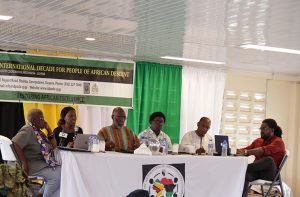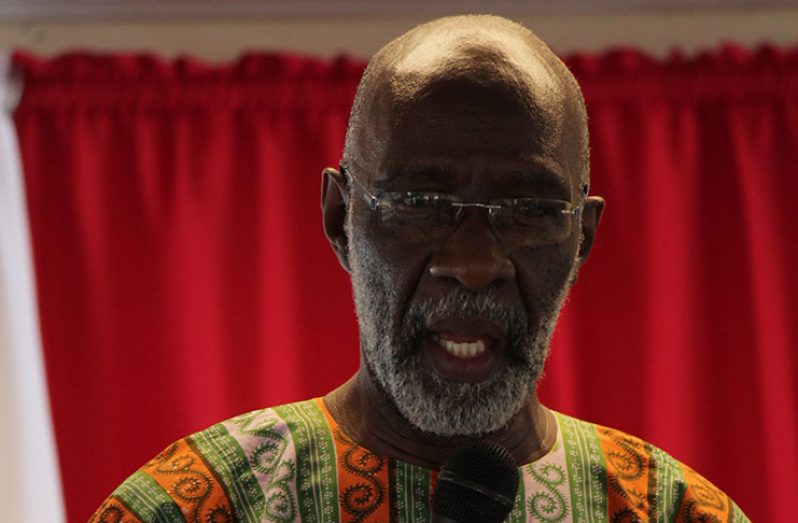AFRO-GUYANESE will aim to establish village councils on ancestral lands as part of efforts to foster greater local economic development in African communities, according to IDPADA-G Chairperson, Vincent Alexander.
This was made known on Sunday, at a symposium organised on the African Village Movement, by the International Decade for People of African Descent Assembly Guyana (IDPADA-G). The event was held under the United Nations designated International Decade for People of African Descent (2015- 2024).
Alexander highlighted that when IDPADA-G was created as the core group of the people of African descent in Guyana, as part of the efforts of the decade, it was recognised that the loss of, and control over, ancestral lands were among the injustices that Guyanese of African descent suffer.
“[IDPADA-G] decided that this injustice with the ancestral lands should be thoroughly investigated and the solutions found should be part of the reparative process of the decade,” Alexander said.

It is against this background that body contextualised Article 72 (3) of the Constitution, and saw that it could form part of the way forward.
Article 72 (3) of the Constitution reads: “Municipalities, Neighbourhood Democratic Councils (NDCs) shall be provided for including village and community councils, where there is the need for such councils and where people request their establishment.”
And the IDPADA-G chairperson said, “We recognise that, in part, Article 72(3) provides a mechanism for our resolutions that hasn’t been activated. And so we thought that we could embark on a process that would lead to the villages themselves making use of that article for the re-creation of village councils as a basis for further movement in the effort to gain recognition, justice and development.”
This is in direct alignment to the International Decade, which is being fostered under the theme: “People of African descent: recognition, justice and development.” According to the UN: “In proclaiming this decade, the international community is recognising that people of African descent represent a distinct group, whose human rights must be promoted and protected.”
Following Sunday’s symposium, the chairperson shared that the body would also aim to visit villages and communities to share more information and to begin canvassing the views of people, with the aim of ultimately petitioning for the re-creation of village councils. The control and ownership of these lands would be one of the specific things that those village councils would be responsible for, he said.
Alexander reflected on the history of Afro-Guyanese and reminded that after the long and tumultuous period of African enslavement ended, plantations were bought over time and made into active villages that subsequently became local authorities.
However, following the establishment of these villages, Alexander said that there was intervention through central government and mechanisms of the local authorities to stymie the development of these villages.
“In so doing, one of the infected elements was the use of land for productive purposes,” he posited. “Let it be told that there was much production taking place before emancipation in the rural villages and in the villages after emancipation. They were literally feeding themselves with enough to sell to others.”
Local historian Dr. Melissa Ifill, during her presentation, highlighted that planters would flood the lands intentionally and fostered hostility within the communities. She also noted that lands were bought and established communally, and with funds exhausted there was little leeway to foster technological development or even allow proper maintenance of lands.
Then came the further development of the local government system during the post-independence era, which, according to Alexander, served as a further hindrance to the control and ownership of Afro-Guyanese lands.
“We now have a state of affairs where most of our villages are embedded as part of the NDCs and by virtue of that embedment, the people of those villages have lost control of those villages and more particularly, over their lands,” he said.
There are many problems that people of African descent face that still have to be addressed, Vincent noted. He however shared that this issue of ownership and control has been identified as one of the central issues.
“IDPADA-G identified from the very inception that this is one of the major problems facing people of African descent and if we are truly to have a decade that sought to bring recognition, justice and development to people of African descent that has to be one of the central problems that has to be addressed,” he said.
Guyana Reparations Committee Chairman Dr Eric Phillips however opined that more than just establishing village councils to right the injustices faced by the community, Afro-Guyanese must work to achieve economic autonomy.
Phillips reminded that the direction the government is moving towards is creating a green economy, and for Afro-Guyanese and their communities to develop, they would have to align themselves with that move.
Economist Jason Fraser added to Phillips’ sentiments by sharing that local economic development starts with a vision, which should translate into a plan for the way forward. And as such, he urged that the Afro-Guyanese leaders understand that the strengths, weaknesses and opportunities presented in each community must be considered and considered in the context of the political arena.




.jpg)









